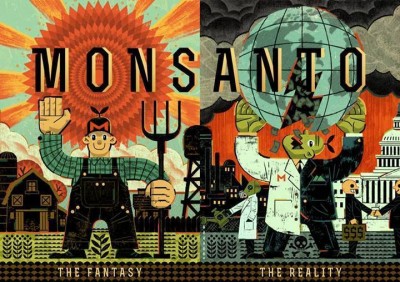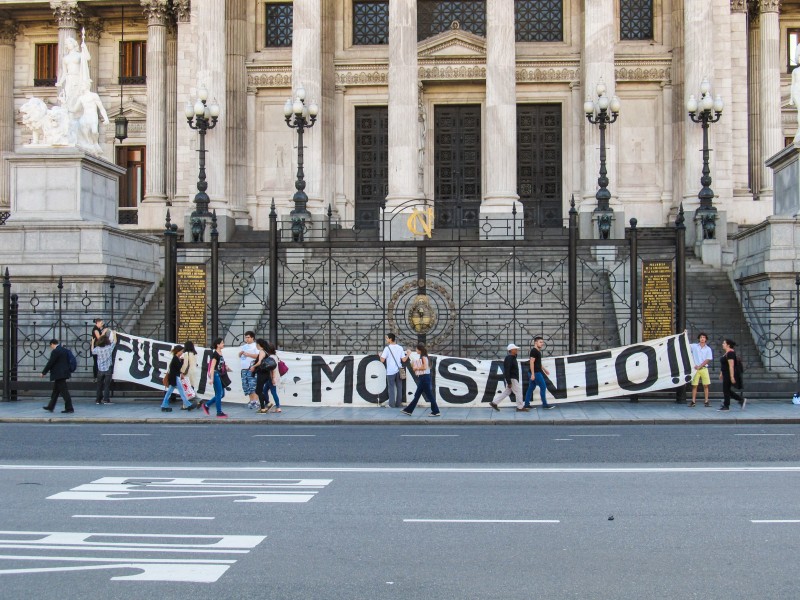On May 23, a protest march against the multinational Monsanto [2] was held simultaneously in several cities across Argentina, bringing together environmental groups and activists on a “Global Day of Action Against Monsanto [3].”
Monsanto is a multinational company dedicated to the production of genetically modified seeds (GM) and chemical products for industrial-scale agriculture. One of its foremost products is glyphosate [4], the main component of the herbicide brand Roundup. Critics say Roundup has toxic effects on plants, livestock and people.
Beyond Argentina, a similar protest is being organized by the international movement Occupy Monsanto [5] and the campaign Millions Against Monsanto [6], both of which began in the United States. Since information about the negative effects of glyphosate and GM seeds came to light over a decade ago, the marches have become more frequent each year.
In the megacity of Buenos Aires, the protest marches usually take place on the Plaza San Martin, near the multinational's main country office. The following video shows images from the protest that took place in May 2014, featuring folk and cultural expressions from regions in the country where Monsanto spraying is most prevalent.
The fight against GM crops has been carried out since the turn of the millennium [7]in many countries after several studies by independent research centers and universities cast doubt over their safety.
As early as 2002, the blog Ecoportal published a report on the Toxicology of Glyphosate [8] by Dr Jorge Kaczewer, founder and medical director of the Argentinian Institute of Neural Therapy and Integrative Medicine [9], wherein the author accused Monsanto and related laboratories of corruption:
The toxicological studies on glyphosate officially required for registration and approval, have been associated with fraudulent practices.

“Fantasy and Reality”. Photo from Facebook page “Millions Against Monsanto”.
Kaczewer concluded:
Junto con la ayuda alimentaria de enormes raciones de soja elaborada como milanesa, hamburguesa, albóndiga, fideo, raviol, leche, yogur, y queso “de soja”, ahora, casi 17 millones de argentinos empobrecidos y hambrientos también recibirán su dosis masiva de glifosato…. La implacable estrategia comercial de la industria nos permite anticipar cómo ésta visualiza su camino hacia un próspero futuro…. a costa de la salud de millones de personas ni siquiera todavía informadas de la existencia de este tipo de productos.
Along with food aid that includes a huge amount of soybean products that are prepared as breaded soy meat, hamburgers, meatballs, spaghetti, ravioli, milk, yogurt, and soy cheese, almost 17 million Argentines, impoverished and hungry, will also get their massive dose of glyphosate…. The industry's relentless business strategy allows us to anticipate how it will forge a path to a prosperous future…. at the expense of the health of millions that still do not even know about the existence of such products.
More recently, in September 2014, the environmentalist blog BWN Argentina [10] published a report by Ignacio Diego Mur where he describes ‘the 12 most terrible products’ created by Monsanto, analysing its effects on the Argentinian agribusiness economy, where the ‘Monsanto model’ has been widely adopted:
En lugar de frutos sanos, verduras, granos y animales alimentados con hierba natural, las granjas industriales de Estados Unidos y Argentina producen un exceso de comida chatarra de ingeniería genética para ocasionar enfermedades cardíacas, derrame cerebral, diabetes y cáncer, con el respaldo de subsidios agrícolas, mientras que los agricultores orgánicos no reciben dichas subvenciones.
Instead of healthy fruits, vegetables, grains and natural grass fed animals, the factory farms in the United States and Argentina produce an excess of genetic engineering junk food that causes heart disease, strokes, diabetes and cancer, with the support of agricultural subsidies, while organic farmers do not receive such subsidies.
Glyphosate toxicity is a political hot potato in Argentina involving multiple stakeholders (governments, companies, laboratories, farmers, workers, trade unions and consumers), numerous vested interests and plentiful misinformation.
Amid the furore are the people living near sprayed areas or consuming food containing residues of the product.
En #Argentina [11] se fumigan cada año 300 millones de litros de glifosato sobre 28 millones de hectáreas y más de 10 millones de personas.
— Partido Pirata (Arg) (@PartidoPirataAr) May 9, 2015 [12]
In #Argentina [13] 300 million liters of glyphosate are sprayed annually across 28 million hectares of plantation, affecting more than 10 million people.
Given the low level of support from government agencies and the mainstream media, the movement is turning to blogs and social networks to disseminate information on the reasons for lawsuits against the company and its products. It also shares research, cases studies, articles and images:
Sociedad Argentina de Hemato-Oncología Pediátrica (entre otras) pidió tomar medidas contar el uso del #glifosato [14]. http://t.co/5ghNA24vct [15]
— #FueraMonsanto (@Noamonsanto) May 11, 2015 [16]
The Argentinian Pediatric Society of Hematology-Oncology (among others) has asked for action to be taken against the use of #glifosato [13]
There are also popular figures from the music world supporting the fight against the company, such as Argentine pop singer, Axel, who stated via his official Twitter account:
#NoaMonsanto [17] gran responsable d enfermedades en la humanidad, catástrofes climáticas, entre otras cosas. @ConSol_ONG [18] http://t.co/cLlH5z2unv [19]
— Axel (@AxelOficial) February 19, 2015 [20]
#NoaMonsanto [13] is largely responsible for diseases, climatic disasters, and other things.
Social networks have become the campaign's main medium to share information. The Facebook page “Millones Contra Monsanto [21]” with more than 55,000 likes, shared the invitation to join the protests in different cities across the country. On Twitter people are exchanging information and views through hashtags like #fueramonsanto, #noamonsanto, #stopmonsanto and others.
23 Mayo 2015 Marcha Mundial contra #Monsanto [22]. En todo el Mundo en todas sus plantas #fueramonsanto [23] via @Noamonsanto [24] pic.twitter.com/UoE9pHWoJP [25]
— Lluís Ahicart (@lluisahicart) May 21, 2015 [26]
May 23, 2015 Global March against #Monsanto [13]. Around the World and in all of its plantations #fueramonsanto [13].
